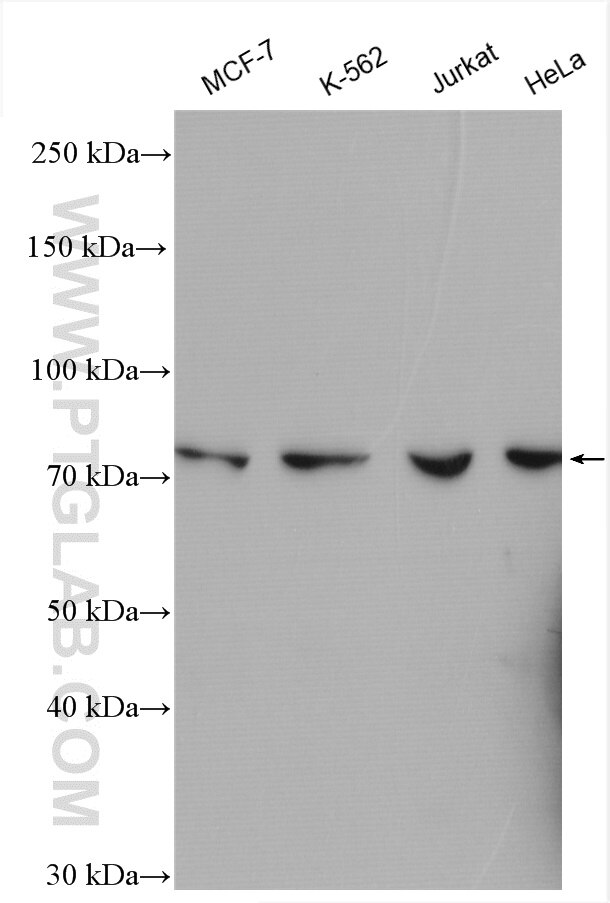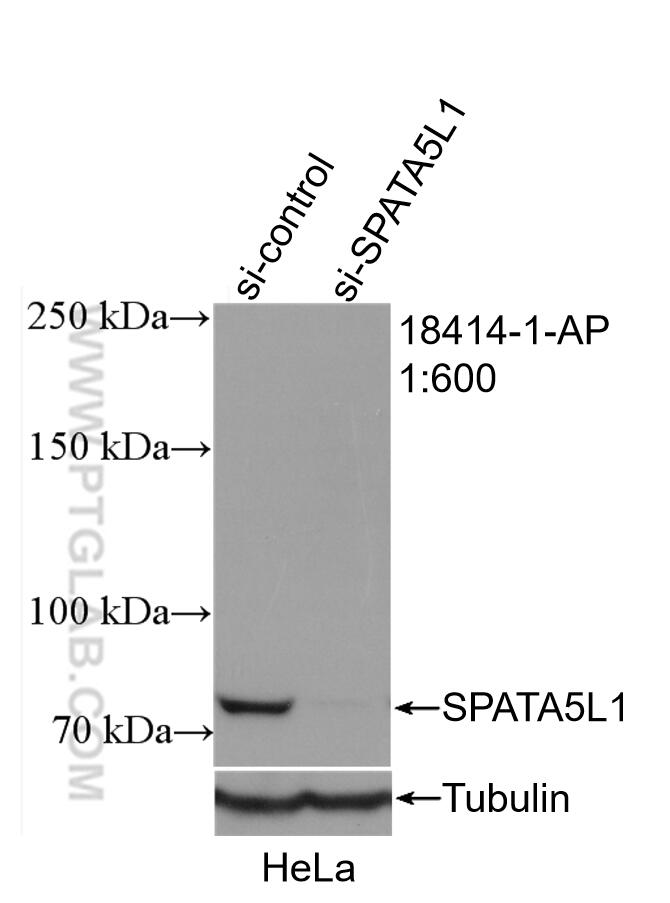Tested Applications
| Positive WB detected in | MCF-7 cells, HeLa cells, Jurkat cells, K-562 cells |
Recommended dilution
| Application | Dilution |
|---|---|
| Western Blot (WB) | WB : 1:500-1:1000 |
| It is recommended that this reagent should be titrated in each testing system to obtain optimal results. | |
| Sample-dependent, Check data in validation data gallery. | |
Product Information
18414-1-AP targets SPATA5L1 in WB, ELISA applications and shows reactivity with human samples.
| Tested Reactivity | human |
| Host / Isotype | Rabbit / IgG |
| Class | Polyclonal |
| Type | Antibody |
| Immunogen |
CatNo: Ag13269 Product name: Recombinant human SPATA5L1 protein Source: e coli.-derived, PGEX-4T Tag: GST Domain: 1-351 aa of BC000981 Sequence: MAPDSDPFPEGPLLKLLPLDARDRGTQRCRLGPAALHALGARLGSAVKISLPDGGSCLCTAWPRRDGADGFVQLDPLCASPGAAVGASRSRRSLSLNRLLLVPCPPLRRVAVWPVLRERAGAPGARNTAAVLEAAQELLRNRPISLGHVVVAPPGAPGLVAALHIVGGTPSPDPAGLVTPRTRVSLGGEPPSEAQPQPEVPLGGLSEAADSLRELLRLPLRYPRALTALGLAVPRGVLLAGPPGVGKTQLVQAVAREAGAELLAVSAPALQGSRPGETEENVRRVFQRARELASRGPSLLFLDEMDALCPQRGSRAPESRVVAQVLTLLDGASGDREVVVVGATNRPDALD Predict reactive species |
| Full Name | spermatogenesis associated 5-like 1 |
| Calculated Molecular Weight | 81 kDa |
| Observed Molecular Weight | 81 kDa |
| GenBank Accession Number | BC000981 |
| Gene Symbol | SPATA5L1 |
| Gene ID (NCBI) | 79029 |
| RRID | AB_2918062 |
| Conjugate | Unconjugated |
| Form | Liquid |
| Purification Method | Antigen affinity purification |
| UNIPROT ID | Q9BVQ7 |
| Storage Buffer | PBS with 0.02% sodium azide and 50% glycerol, pH 7.3. |
| Storage Conditions | Store at -20°C. Stable for one year after shipment. Aliquoting is unnecessary for -20oC storage. 20ul sizes contain 0.1% BSA. |
Background Information
SPATA5L1 (Spermatogenesis-associated protein 5-like protein 1) belongs to the AAA+ATPase protein superfamily. A full-length SPATA5L1 transcript and a short SPATA5L1 variant can be produced in human by alternative splicing. Bi-allelic SPATA5L1 variants lead to a human disease characterized by sensorineural hearing loss with or without a nonprogressive mixed neurodevelopmental phenotype. And immunofluorescence analysis in rat hippocampal neurons demonstrated that SPATA5L1 was located in neuronal and glial cell nuclei, with more prominent expression in neurons (PubMed:34626583). SPATA5L1 also has 3 isoforms.
Protocols
| Product Specific Protocols | |
|---|---|
| WB protocol for SPATA5L1 antibody 18414-1-AP | Download protocol |
| Standard Protocols | |
|---|---|
| Click here to view our Standard Protocols |






